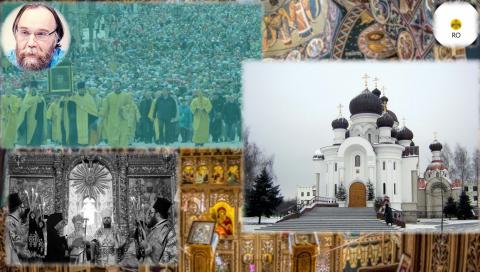We (people) are the Church
Primary tabs

Today one can often hear the opinion that our Church is wrong in something, does something wrong, does something wrong, and there are even worse expressions. However, it should be recalled that in the Orthodox tradition the concept of the Church includes all believers – or, more precisely, all Christians baptized in the Russian Orthodox Church.
This is one of the main differences from Catholicism. Western Christianity understands the church only as an aggregate of the priestly class – deacons, priests and bishops. And ordinary Christians are placed in the outer circle. They are not inside the church, but around it. Hence the theory of the Pope’s infallibility. He is the head of the Catholic Church in the sense that he stands at the top of the entire institution, being the direct ruler and leader of all lower church ranks.
Until very recently, separation in the sacrament was even practiced in Catholicism – ordinary Catholics were given only wafers, and the Blood of Christ, along with wafers, was consumed only by members of the hierarchy, who constituted the Church.
In contrast to this, a completely different teaching was established in Orthodoxy. The Church of Christ is not an institution, not a place for worship, not a collection of clergy. This is a mystical unity that includes all Orthodox Christians – both laity and priests.
Therefore, for a simple layman, any criticism of the Church meant criticism of himself, self-criticism. If some kind of disorder was noticed in the Church, then the guilt must be sought first of all in oneself. Individuals and clergy and laity could deviate from the norms of piety, lead inappropriate lifestyles, sin and deviate from the true path. But this could not apply to the Church as a whole. Because along with the fall, there were also ups, along with apostasy and examples of the highest holiness, along with error, the radiance of truth.
What happens in the Church of Christ and what happens in the soul of an individual person, its members, are not two different non-intersecting worlds, not two autonomous realities. The church is all of us. And we are all the Church. To regard only clergy and church institutions as the Church means to understand nothing at all in Orthodoxy. After all, the figure of the patriarch in Eastern Christianity was interpreted in a completely different way – the patriarch is the first of their bishops, but by no means the lord of the church, not the ruler. He is a part of the Church, but not all of it. He is the same person as the rest of us. He can make mistakes and stumble. And his responsibility before God is akin to our responsibility.
But if we return to this understanding, then all criticism of the Church, which in our society, alas, is becoming more and more harsh, will change its meaning. If we believe that the church hierarchy has become too close to Catholicism and we notice attempts to turn it into a semblance of papism with the inevitable appearance of the figure of the Grand Inquisitor, then this is a deviation from the norms of the Church, it is not the Church who does it, but what is unhealthy in it. And this ill health is nourished by the ill health of our own souls, minds, our spiritual weakness.
The situation is exactly the same with liberalism in church circles. The Church cannot bear responsibility for it – liberalism as a philosophy is a direct antithesis to Christianity, as sin is a direct antithesis to piety, and drunkenness is sobriety. Both Catholic and liberal heresies are sickness and apostasy. But this must be corrected not by indignation and criticism, but by one’s own inner enlightenment, health improvement, the desire to restore the foundations of our true Orthodox tradition.
The truly Orthodox experience of one Christian may turn out to be the drop that will change the final balance of illness and health in the whole body of Christ. Just as a tiny virus can poison the entire body, defeating it at the level of one cell can stop the disease and restore the fullness of life.
It is clear that many processes in modern Orthodoxy and in the hierarchy and in the state of mind cause natural alarm. But when it turns into aggressive attacks, sarcasm, poisonous hysterical loud formulas – the situation only gets worse. To return to the straight path, one must have a living experience of moving along it. And what Christian can boast that his path is straight? Such pride would instantly debunk all of his claims. Only Christ our God is Truth. And He is the Way to her. By becoming Christians, we take this path. And it is very difficult.
And when claims arise against the Church, then it is worth turning them to ourselves. And correct, cleanse and exalt ourselves. And only then everything will change – let each cell fight the disease as best it can within itself. You should not fall into despair – cell by cell, taking the path of Christ, will overcome any obstacle.
